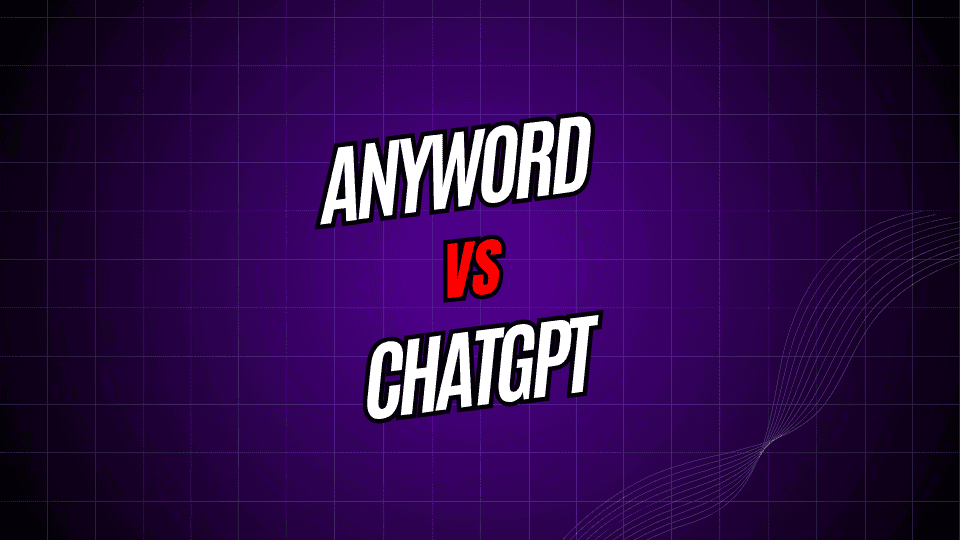
Artificial intelligence has changed how we create content, making it easier for writers and marketers to whip up everything from tweets to full-length articles. Two leading platforms are Anyword, which specializes in copywriting, and ChatGPT from OpenAI, which works well for almost any kind of text. The big question is: which one works best for your needs?
In this detailed guide, we’ll break down the main differences between Anyword and ChatGPT, highlight what each one does best, and point out which tool might suit your writing goals better.
What Is Anyword?
Anyword is an AI writing tool built just for marketers and businesses that need copy that gets results. Its main mission is to help you create text that drives action, whether that’s clicking a link, signing up, or making a purchase.
Anyword shines when it comes to common marketing formats: ads, email blasts, social posts, and landing pages. The standout feature is its predictive scoring. After you type your copy, Anyword estimates how well it will perform based on past data, giving you a score that helps you make data-driven tweaks before you hit publish.
Key features of Anyword are:
- Performance prediction scores for your content, so you see what works.
- Brand voice customization to keep your tone consistent.
- Team collaboration tools for easy feedback.
- Integration with popular marketing platforms so reports are seamless.
- A/B testing to see what headlines or calls to action land best.
- Templates tailored for specific marketing use cases—ads, landing pages, you name it.
What is ChatGPT?
ChatGPT is the AI buddy from OpenAI. It can answer questions, write code, brainstorm ideas, and generate long-form content. While Anyword is dialed into marketing, ChatGPT is a multi-tool that adapts to almost any writing job.
You talk to it in a chat window, refining your requests and building on its answers. This back-and-forth is handy for early brainstorming, digging into research, or layering on details for a blog post.
Key features of ChatGPT are:
- A chat interface that feels like talking to a friend.
- A wide-ranging knowledge base that pulls from many topics.
- The ability to tackle complex, step-by-step questions.
- Code writing and debugging for developers.
- Support for multiple languages.
- Custom instructions to adjust how it replies to you.
Content Quality and Accuracy
Both tools serve up polished content, but each shines in its own lane.
Anyword shines when it comes to crafting marketing text that grabs attention and drives conversions. Its training data is built on scores of successful ad campaigns, letting it produce lines that fit the feel of specific marketing channels. The copy comes out short, compelling, and leverages classic copywriting tricks that work.
ChatGPT shines on versatility. Whether you need an instruction manual, a poem, or a full novel, it can handle the job with surprising depth. Because it’s a more general tool, though, you’ll often need to craft specific prompts to get the marketing punch that Anyword delivers without extra nudges.
On the accuracy front, both can trip up with old or wrong facts. ChatGPT’s data stops in October 2021, so any new developments are a blind spot. Anyword, focused on copy, isn’t the best choice for content that demands precise, up-to-date details.
Ease of Use and User Experience
Anyword offers a more guided path. Its library of templates lets you pick exactly what you need—like a Facebook ad or a catchy email subject—so even beginners can jump in and create fast. The layout is clean, with straightforward buttons and key metrics that tell you how the text is likely to perform.
ChatGPT’s chat interface feels like chatting with a savvy friend. The simple, conversational design means everyone, from beginners to pros, can jump in. Yet, to get the most helpful answers, it helps to learn how to write solid prompts. There’s a small learning curve, but it can pay off quickly.
Pricing and Value
Anyword uses a subscription plan, so costs rise depending on how much you use it and the features you need. You can choose from:
- Starter plans for solo users
- Business plans with extra features and bigger usage caps
- Enterprise plans with prices that adjust to your needs
ChatGPT offers:
- A free version that covers the basics but has some limits
- ChatGPT Plus for extra features and quicker access
- API access for devs and teams wanting deeper integration
Which one is a better deal depends on your goals. Anyword’s prices match its sharper focus on marketing tools, like the performance prediction feature. ChatGPT, with its wider range and lower entry cost, appeals to anyone wanting a flexible writing partner.
Performance and Speed
Both tools respond quickly, but they feel different in practice.
Anyword creates several content variations at once, letting users see predicted performance scores side by side. This batch method saves time, making it handy for gathering all the pieces needed for a full marketing campaign.
On the other hand, ChatGPT shines in back-and-forth editing. Users can ask for tweaks, a different tone, or a completely new angle in a single message. This conversational style means you never lose the thread—you just keep polishing the original idea.
Integration and Workflow
Anyword plugs right into platforms like Facebook Ads, Google Ads, and most email services. You can write, tweak, and publish without bouncing between tabs, so the workflow stays smooth.
ChatGPT is accessible via an API, so developers can weave it into any app or process they’re building. While it doesn’t come with marketing links out of the box, its range of possible uses stretches far beyond just ads and email.
Customization and Brand Voice
Anyword lets you feed in brand guidelines, tone preferences, and key messaging. The AI learns and then churns out copy that feels like it came straight from your brand voice guide. This is a lifesaver for campaigns that need consistent messaging across channels.
ChatGPT gives users the ability to personalize through custom instructions and keeps a conversation history. However, it takes more manual work to keep a brand consistent across different sessions and use cases.
Use Case Scenarios
Select Anyword if you:
- Create mostly marketing and advertising content.
- Want to see performance predictions for your copy.
- Prefer ready-made templates for typical marketing situations.
- Need easy links to ad platforms.
- Collaborate in a team and need smooth sharing.
- Value marketing know-how more than all-around tools.
Select ChatGPT if you:
- Want a flexible tool that works for many types of content.
- Like a chat-style interface for refining content step by step.
- Want to mix writing with tasks like research or analysis.
- Need help with technical documents or code.
- Are on a tight budget but need broad AI help.
- Prefer being able to switch features instead of having a single focus.
Making the Right Choice for Your Needs
Choosing between Anyword and ChatGPT comes down to your budget, specific needs, and the way you like to work.
If you’re a marketer or a brand focused on content that drives performance, Anyword’s features and predictive tools give clear benefits. Its marketing-centered design and connected workflow can boost efficiency and outcomes for ad campaigns.
If you’re looking for a writing assistant that can tackle all kinds of tasks and content types, ChatGPT’s flexible, chat-like design can be a real win. It covers a wider range of functions and comes at a lower price, making it a strong choice, especially for individuals and small businesses.
Many users find that using both tools, in a tag-team approach, can work well. They might use Anyword to craft focused marketing messages and ChatGPT for deeper research or to write blog posts, stories, or emails.
Choosing Your Best AI Writing Buddy
Anyword and ChatGPT both mark big jumps in AI writing, but they serve different needs. Anyword is laser-focused on marketing, helping you guess how well a headline or ad might perform and playing well with ad platforms. ChatGPT, on the other hand, is like having a small-talk friend who can also draft reports, brainstorm ideas, or explain tricky topics.
Try out the free trials or starter plans for both. Notice which one clicks with how you like to work and which gets you the results you’re after.
The world of AI writing is changing fast, with new tools and updates dropping all the time. Pick the one that fits, and you’ll have smart tech at your side to speed up your writing and boost the final outcome.
Anyword vs ChatGPT: AI Writing Tools Compared (2026)
Choosing the right AI writing tool can boost your content game, save time, and improve your messaging. In this post, we’ll compare Anyword and ChatGPT based on what matters most: marketing capabilities, pricing, features, and what suits your specific needs.
1. Marketing Capabilities
Anyword
Anyword shines for marketers. It offers templates designed for ads, social posts, and email campaigns. The predictive score tells you how likely your copy is to convert based on past performance predictions.
ChatGPT
ChatGPT is more general. While you can easily use it for marketing, it doesn’t have the same built-in optimization for ads. You might need to tweak prompts several times to get the perfect headline or call to action.
Winner: Anyword
For marketing teams needing quick, optimized output, Anyword is the clear choice.
2. Pricing
Anyword
Anyword offers a monthly or yearly subscription. Plans start at around $19 per month and go up based on the word count and additional features like performance predictions.
ChatGPT
ChatGPT has a free version, but the ChatGPT Plus plan, which unlocks GPT-4 and faster performance, costs $20 per month. You get the full model but pay per use.
Winner: ChatGPT
If you’re on a tight budget or need deep, conversational content, ChatGPT’s free tier is a strong option.
3. Features
Anyword
- Template Library: Ready-made templates for ads, landing pages, emails, and blogs.
- Audience Targeting: Create copy that speaks to different customer segments.
- Performance Score: Predictive analytics help you pick the best variation.
ChatGPT
- Conversational Interface: You can refine your content, ask for rewrites, and get explanations.
- Long-Form Capabilities: Easily generate articles, guides, and detailed content.
- API Access: Integrate it into your own apps or tools for custom use.
Winner: Tie
Anyword is perfect for quick marketing copy, while ChatGPT excels at longer, conversational writing.
4. Best For
Anyword
- Marketing teams needing fast, optimized outputs.
- Users who want clear, analysis-backed copy suggestions.
- Entrepreneurs writing social ads and email campaigns.
ChatGPT
- Bloggers and writers who want to brainstorm, outline, and refine.
- Developers needing a flexible AI through the API.
- Teams requiring in-depth, narrative-driven content.
Winner: Depends on Use Case
For fast marketing copy, go with Anyword. For deep, flexible writing, ChatGPT is best.
Conclusion
Both Anyword and ChatGPT have strengths, and the right tool for you depends on what you write most. For pure marketing speed and optimization, Anyword takes the crown. For flexible, multi-purpose content creation, ChatGPT shines. Consider your workflow, budget, and what type of writing you do most to pick the best tool for your needs.
